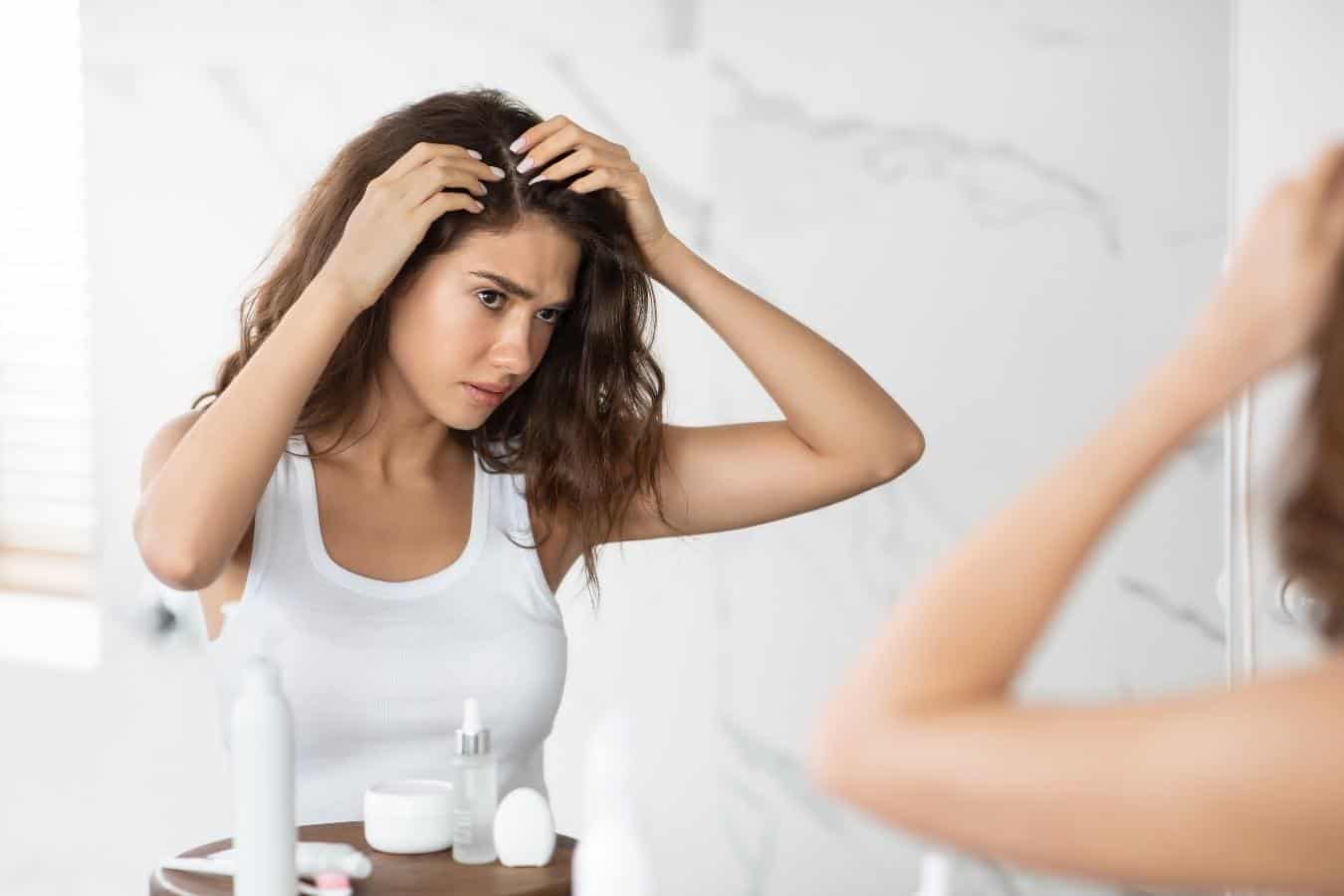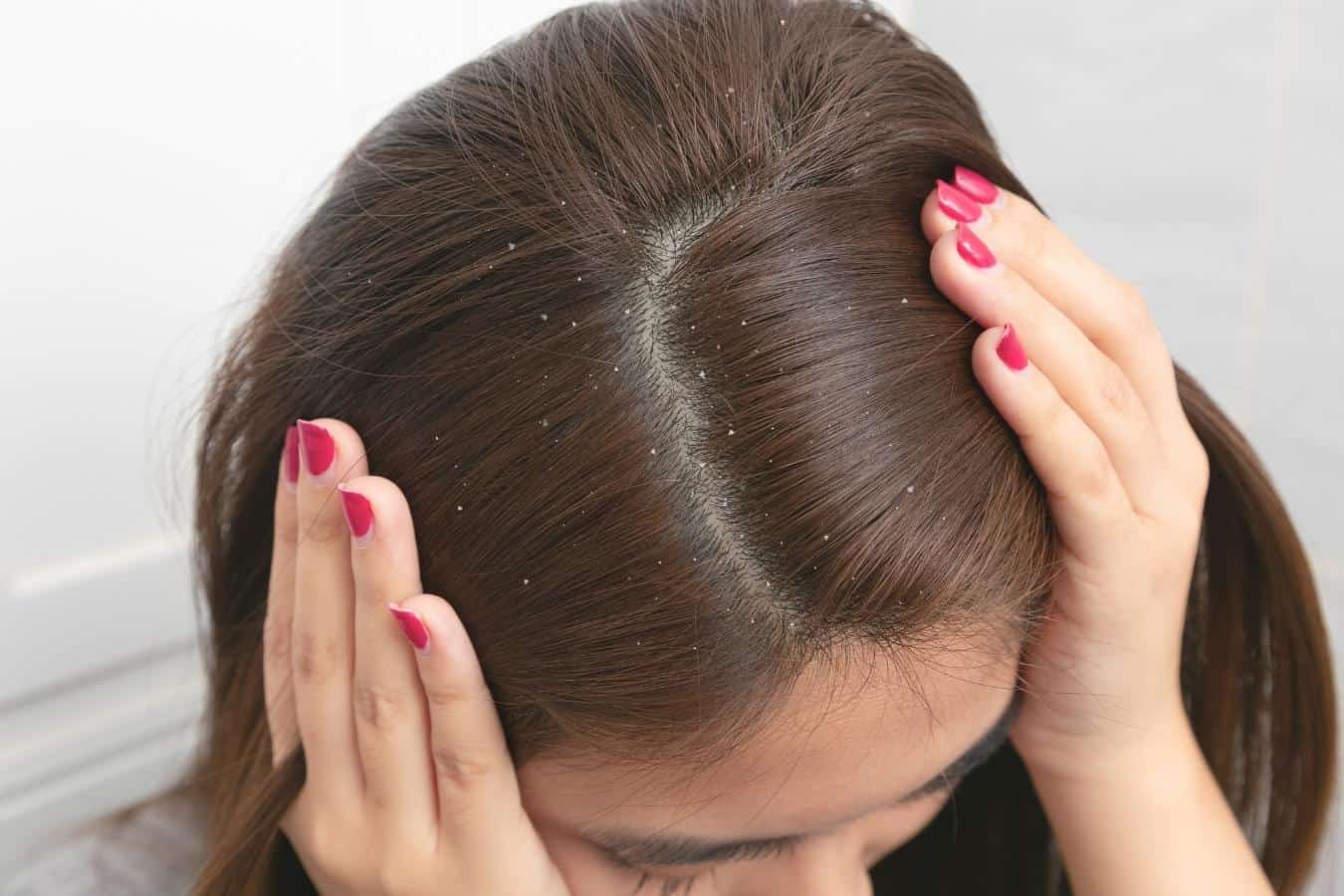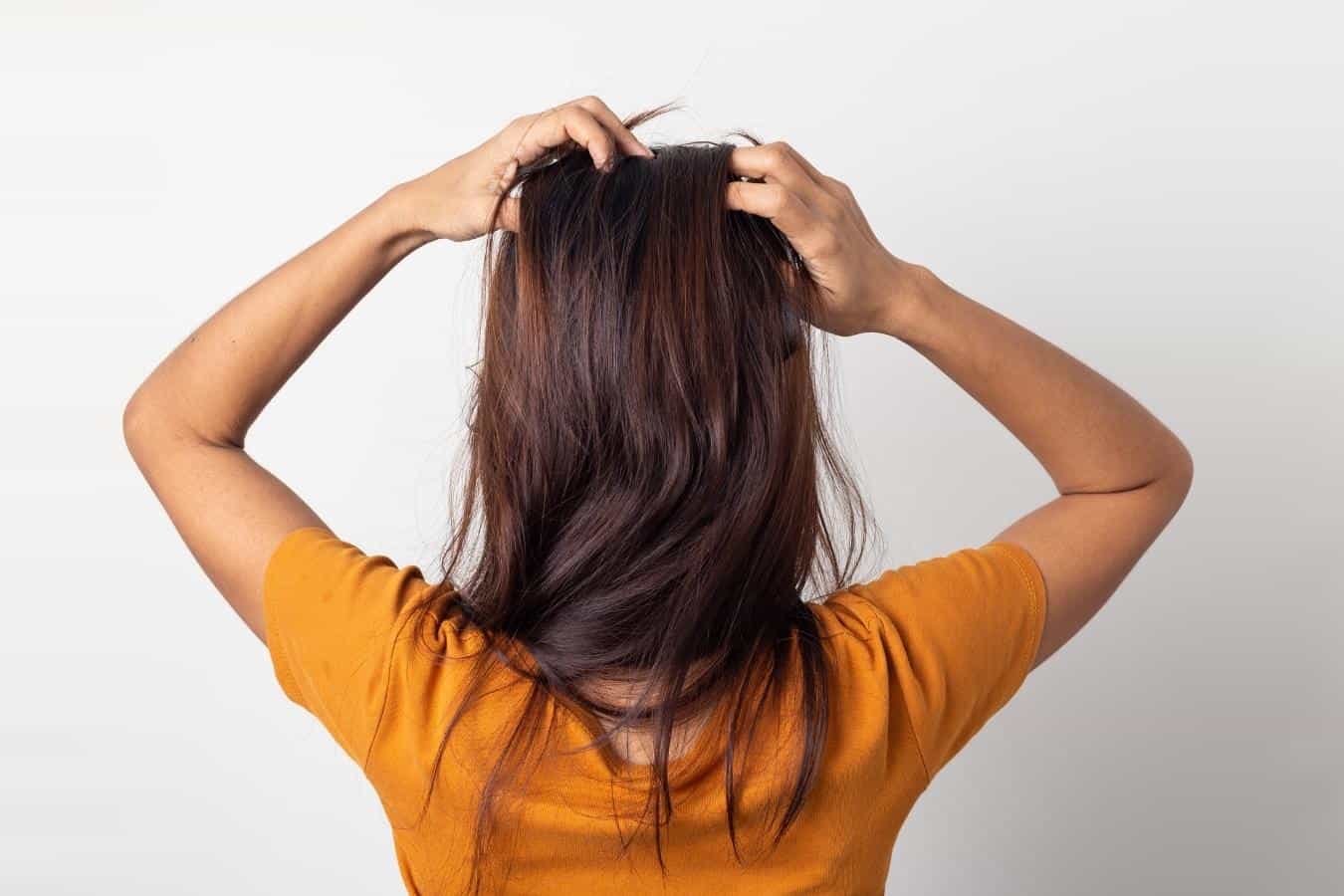While dandruff isn’t a serious condition, it can be a source of embarrassment. Not only can it be difficult to treat dandruff, but many hair products can actually make it worse. Does dying hair cause dandruff, or can people with dandruff dye their hair without any issues?

Dying your hair can cause scalp irritation, which can be a trigger for people that suffer from dandruff. Some dyes may also leave a flaky residue on the scalp. If you struggle with dandruff, you’ll want to proceed with caution before coloring your hair.
What Is Dandruff?
Dandruff is a skin condition that can cause your scalp to produce dry, white flakes.
These flakes can wind up in your hair and your clothing. The condition can also leave you with an itchy or irritated scalp.
Dandruff is a common condition that affects an estimated 50% of people worldwide. (1)
It usually starts between the ages of 10 and 20 and continues into adulthood.
Although dandruff is a mild condition that doesn’t cause any severe health symptoms, it can be a source of stress and frustration.
Common Causes Of Dandruff
When you have dandruff, your scalp is essentially signaling to you that it’s unhappy.
It’s a sign that your scalp is irritated in some way and needs nourishment.
Some of the most common causes of dandruff include:
- Pre-existing skin conditions
- Dry or irritated skin
- Overbrushing
- Contact dermatitis
- Yeast or fungus on the scalp
- Pressure from hats
- Sun exposure
Can Hair Dye Cause Dandruff?

Many hair dyes use a combination of chemicals to change the color of your hair.
For example, dyes often use ammonia, which is able to break through the proteins that protect your hair, allowing the dye to directly access your hair shaft. (2)
These chemicals can be effective, but they can also take a toll on your hair and scalp.
Using hair dye can leave your scalp dry and irritated, which can be a problem if you suffer from dandruff.
Dandruff is an indicator that your scalp needs nourishment. If you strip moisture and protein from your scalp, you could wind up making these problems much worse.
Hair dye also can also be a source of contact dermatitis, a skin rash that’s caused by prolonged exposure to an irritating substance.
Not only can this condition cause symptoms like swelling, burning, itching, and scaling on the skin, but it’s also a major trigger for dandruff.
Even if you’ve never had dandruff before, it’s always best to patch test hair dye before applying it to your entire scalp.
If your scalp is dry, or if you’ve been dealing with scalp irritation, you should be aware that coloring your hair could make these issues worse.
While harsh chemicals are used in many hair dyes, there are dyes that are made with natural and non-toxic ingredients.
If you’re concerned about the impact that dye will have on your scalp, a chemical-free dye might be the best fit for your needs.
How To Get Rid Of Dandruff After Dying Your Hair
While it’s common to use a special shampoo to clear up dandruff, dandruff shampoos aren’t the best option for color-treated hair.
Many medicated shampoos will strip artificial color from your hair, making it look like you never dyed your hair at all.
You can still use dandruff shampoos as a last resort, but there are plenty of ways to clear up damage that won’t damage your hair color.
These are some of the best ways to soothe your scalp and stop dandruff in its tracks:
Exfoliation
Exfoliating your scalp can help remove skin flakes, instantly clearing up your dandruff. A scalp scrub can be a very effective treatment, especially if you add moisturizing ingredients to your scalp afterwards.
You can use a store-bought scrub to treat your scalp or make your own scrub at home.
Baking Soda
If you don’t have a scrub on-hand, baking soda is another great way to exfoliate your scalp.
Baking soda is extremely gentle, which makes it a particularly great exfoliant for a sensitive and irritated scalp.
You can take advantage of its exfoliating properties by massaging a tablespoon of baking soda into the wet hair on your scalp before you apply shampoo.
Coconut Oil
Coconut oil can help trap moisture in your scalp, keeping it from becoming overly dry. If you massage coconut oil into your scalp before you shampoo and condition your hair, you’ll find that your scalp feels more hydrated.
Coconut oil also has anti-microbial properties, which means it may be effective at treating dandruff caused by fungus. (3)
Tea Tree Oil
Like coconut oil, tea tree oil has anti-microbial properties, and it’s an anti-inflammatory as well.
It’s highly effective at fighting dandruff and can help clear up a dandruff flare-up caused by hair dye.
Some people with sensitive scalps find tea tree oil to be irritating, which is why it’s best to patch test the oil before applying it to your entire scalp.
Apple Cider Vinegar
Since apple cider vinegar is highly acidic, it may be able to stimulate the skin follicles on your scalp, helping you to shed dandruff quickly.
Try diluting a few tablespoons of apple cider vinegar with water before massaging it into your scalp. Leave it on for a few minutes before rinsing it out.
Aspirin
This over-the-counter anti-inflammatory medication uses salicylic acid as an active ingredient. That same ingredient is found in many dandruff shampoos.
Crush up an aspirin tablet and mix the powder in with your shampoo to treat your flakes.
How To Prevent Dandruff In The First Place

The healthier your scalp is, the less likely it is that you’ll have issues with dandruff.
These are some of the best ways to keep your scalp healthy and make sure that your hair is dandruff free:
Eat a Healthy Diet
A good diet is essential to healthy skin, and it’s important to the health of your scalp as well.
You should make sure that your diet is high in B vitamins and zinc. Omega-3 fatty acids can also reduce the risk of dandruff.
Protect Your Scalp from the Sun
You’re probably not applying sunblock to your scalp before you go outside, which means your scalp is at risk of a sunburn!
A sunburn can dry out your scalp and cause dandruff. If you know that you’ll be in the sun for a while, you should protect your scalp with a hat.
Develop a Healthy Hair Routine
Work to find a healthy and effective hair care routine that keeps your hair and your scalp in good health.
Try to cut back on the number of products that you use.
Using too many hair products can cause the scalp to become oily, which could eventually lead to dandruff.
Wash Your Pillowcases Regularly
How often do you wash your pillowcases? If you’re sleeping on the same pillowcases night after night, you could be exposing your scalp to fungus or bacteria.
Not only should you make sure that you wash your pillowcase every few days, but you should consider switching to a pillowcase made from satin or silk.
Pay Attention to the Condition of Your Scalp
If you notice that your scalp feels dry or irritated, you should try to get to the bottom of the problem immediately.
Assess your scalp and try to figure out what’s causing the problem.
Whether the issue lies with a new hair product or has another cause, finding the source of the problem can keep you from developing dandruff.
Frequently Asked Questions
If you struggle with dandruff, you should assess the condition of your scalp before dying your hair. It’s best to avoid hair dye if your scalp is inflamed or irritated. If you do decide to color your hair, make sure you moisturize your scalp beforehand.
While stress doesn’t cause dandruff, it can make a dandruff flare-up worse. Many people with dandruff experience more severe symptoms when stress and anxiety levels are high. Managing your stress levels can help you to manage your dandruff.
Many hair dyes contain harsh chemicals. Since the dye has to sit on the scalp for a long stretch of time, those dyes can cause irritation, especially for people with a sensitive scalp.
Herbal dyes don’t contain the same chemicals that are found in other types of hair dyes. They can be an excellent alternative for people that have sensitive scalps or struggle with dandruff.
Sources
- https://www.ncbi.nlm.nih.gov/pmc/articles/PMC4852869
- https://science.howstuffworks.com/innovation/everyday-innovations/hair-coloring3.htm
- https://pubmed.ncbi.nlm.nih.gov/32602684/
Disclaimer: This site is not intended to provide professional or medical advice. All of the content on LovedByCurls.com is for informational purposes only. All advice should be followed at your own discretion. Ingredients may change at any time so always check the product label before using. Check our full disclaimer policy here.
